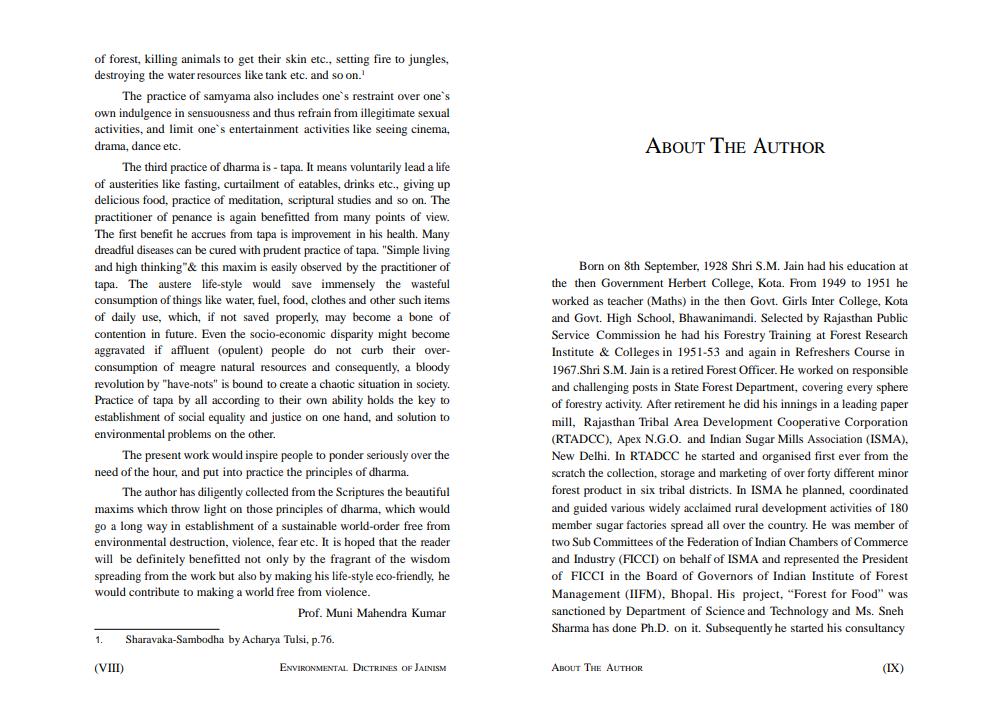________________
ABOUT THE AUTHOR
of forest, killing animals to get their skin etc., setting fire to jungles, destroying the water resources like tank etc. and so on.
The practice of samyama also includes one's restraint over one's own indulgence in sensuousness and thus refrain from illegitimate sexual activities, and limit one's entertainment activities like seeing cinema, drama, dance etc.
The third practice of dharma is - tapa. It means voluntarily lead a life of austerities like fasting, curtailment of eatables, drinks etc., giving up delicious food, practice of meditation, scriptural studies and so on. The practitioner of penance is again benefitted from many points of view. The first benefit he accrues from tapa is improvement in his health. Many dreadful diseases can be cured with prudent practice of tapa. "Simple living and high thinking" & this maxim is easily observed by the practitioner of tapa. The austere life-style would save immensely the wasteful consumption of things like water, fuel, food, clothes and other such items of daily use, which, if not saved properly, may become a bone of contention in future. Even the socio-economic disparity might become aggravated if affluent (opulent) people do not curb their overconsumption of meagre natural resources and consequently, a bloody revolution by "have-nots" is bound to create a chaotic situation in society. Practice of tapa by all according to their own ability holds the key to establishment of social equality and justice on one hand, and solution to environmental problems on the other.
The present work would inspire people to ponder seriously over the need of the hour, and put into practice the principles of dharma.
The author has diligently collected from the Scriptures the beautiful maxims which throw light on those principles of dharma, which would go a long way in establishment of a sustainable world-order free from environmental destruction, violence, fear etc. It is hoped that the reader will be definitely benefitted not only by the fragrant of the wisdom spreading from the work but also by making his life-style eco-friendly, he would contribute to making a world free from violence.
Prof. Muni Mahendra Kumar
Born on 8th September, 1928 Shri S.M. Jain had his education at the then Government Herbert College, Kota. From 1949 to 1951 he worked as teacher (Maths) in the then Govt. Girls Inter College, Kota and Govt. High School, Bhawanimandi. Selected by Rajasthan Public Service Commission he had his Forestry Training at Forest Research Institute & Colleges in 1951-53 and again in Refreshers Course in 1967.Shri S.M. Jain is a retired Forest Officer. He worked on responsible and challenging posts in State Forest Department, covering every sphere of forestry activity. After retirement he did his innings in a leading paper mill, Rajasthan Tribal Area Development Cooperative Corporation (RTADCC), Apex N.G.O. and Indian Sugar Mills Association (ISMA). New Delhi, In RTADCC he started and organised first ever from the scratch the collection, storage and marketing of over forty different minor forest product in six tribal districts. In ISMA he planned, coordinated and guided various widely acclaimed rural development activities of 180 member sugar factories spread all over the country. He was member of two Sub Committees of the Federation of Indian Chambers of Commerce and Industry (FICCI) on behalf of ISMA and represented the President of FICCI in the Board of Governors of Indian Institute of Forest Management (IIFM), Bhopal. His project, "Forest for Food" was sanctioned by Department of Science and Technology and Ms. Sneh Sharma has done Ph.D. on it. Subsequently he started his consultancy
1.
Sharavaka-Sambodha by Acharya Tulsi, p.76.
(VIII)
ENVIRONMENTAL DICTRINES OF JAINISM
ABOUT THE AUTHOR
(IX)




